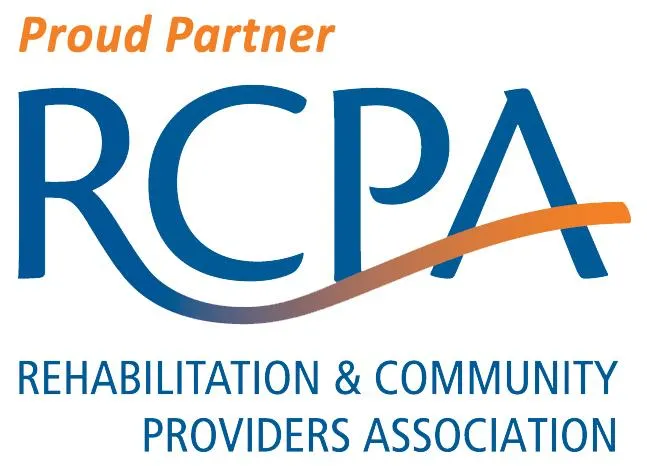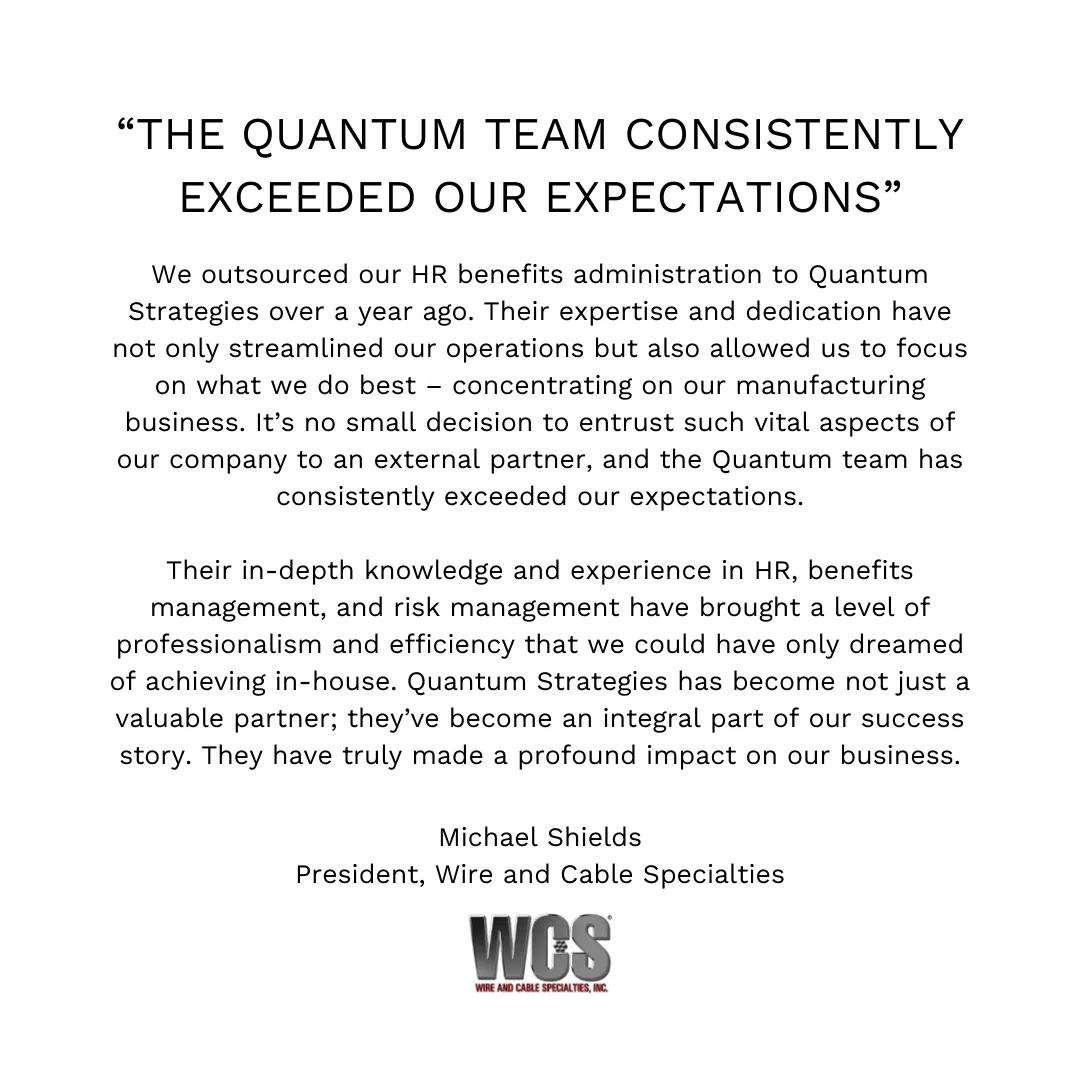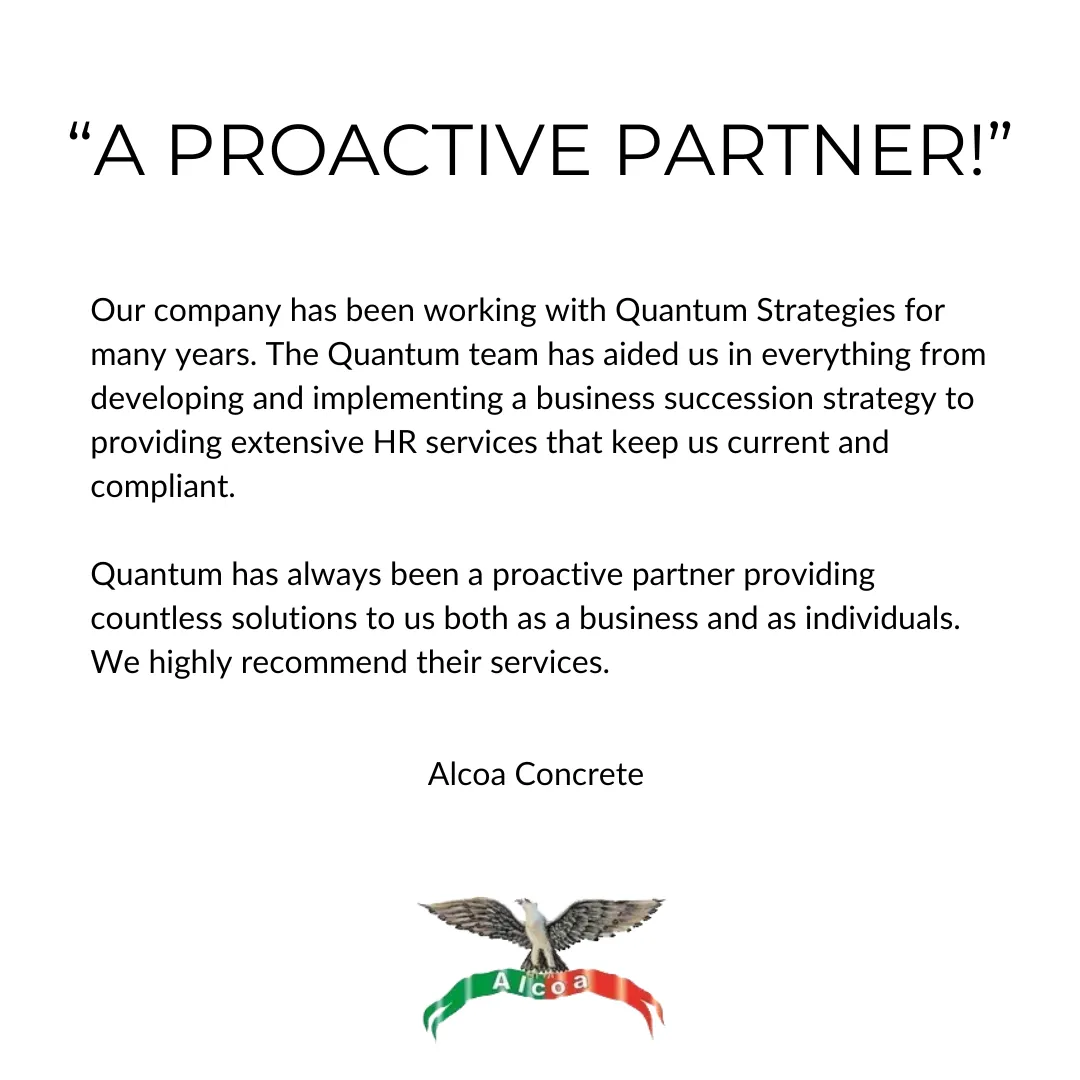Tailored HR Solutions as Unique as Your Business
Expert consulting and service to elevate your HR from a headache to a value driver.
Does Your HR Function Make the Grade?
Take our 5-minute quiz and evaluate the effectiveness of your HR function.

How We Help
We Focus on Your HR Needs,
So You Can Focus on Your Mission.
At Quantum Strategies, we understand that effective human resource management is the cornerstone of every successful business, regardless of size. Our mission is to provide tailored HR solutions that align perfectly with your unique business needs and growth stage.
Our Services
Navigating Change with Confidence: Quantum Expert HR Solutions
From Policy Assistance to Leadership Succession Planning, Quantum Strategies is Your Ultimate HR Resource to Solve Your Business Challenges.
HR Operational
Assessments
Unlock the full potential of your HR department. Our collaborative approach brings clarity and efficiency to your HR operations, providing a thorough analysis of your department's structure, costs, effectiveness, and needs.
Comprehensive Analysis: Detailed evaluation of your organization, workgroups, and individual roles for optimized efficiency.
Objective Insights: Receive a clear blueprint highlighting your HR department's strengths, weaknesses, and gaps.
Strategic Recommendations: Actionable plans focusing on technology utilization, communication enhancement, and leveraging department strengths.
HR Consulting and Managed Services
Tailored to align with your unique needs, our HR consulting and managed services enhance operational efficiency and effectiveness, allowing you to focus on your core mission while we optimize your HR investment.
Expert Supplemental Support: Strengthen your existing HR team with specialized expertise to navigate complex HR landscapes.
Personalized, Agile Solutions: Customized services for organizations with or without HR teams, adaptable to your specific requirements.
Goal-Oriented, Clear Communication: Delivering precise, actionable strategies that align with your organization’s goals and ensure successful execution.
Custom HRIS Design and Integration
Revolutionize your HR data management. Our team will evaluate your current human resources technology stack, offer recommendations, and then integrate your new and existing systems with our cutting-edge technology, ensuring seamless data flow and optimized operational efficiency.
Seamless Integration: Connect legacy systems with modern platforms for streamlined data management.
Tailored Design: Custom HRIS solutions uniquely crafted to meet your specific business needs.
Advanced Analytics: Leverage data-driven insights for strategic decision-making and operational excellence.
“Successfully steering through the specialized HR challenges within organizations of all kinds demands expert understanding, strategic planning, and precise implementation. With comprehensive knowledge of these challenges and the right solutions, your business can stay focused and successful in their vital missions.”
William J. Rizzo

Who we Are.
We Focus on Your HR Needs,
So You Can Focus on Your Mission.
At Quantum Strategies, we recognize that proficient management of human resources is fundamental to the success of any enterprise, irrespective of its scale. Our objective is to deliver customized human resource solutions that are in perfect harmony with your distinct business requirements and developmental phase.
Constant Improvement
Commitment to Customers
High Level Of Knowledge
Best Service You Can Get



Why Choose Us
A True Partner to Solve Your Most Complex HR Challenges.
Empowering HR Innovation and Compliance
Commitment to 100% Client Satisfaction
People-First Approach

Peace of Mind:
Handle ongoing compliance with ease

Employee Satisfaction:
Build a positive workplace with engaged employees

Strategic Confidence:
Drive strategy with advanced analytics

Leadership Development:
Equip your team with the tools to lead

2,245 +
Happy Clients

25 +
Years Of Experience

120 +
Professional Team
Testimonials
The Quantum Commitment - 100% CLIENT SATISFACTION!
At Quantum, we understand that your satisfaction matters most, and The Quantum Commitment is our way of putting that understanding into action. Experience the difference with a team that is dedicated to making your satisfaction the cornerstone of our service. Because when you choose Quantum, you choose excellence, reliability, and a commitment to exceeding your expectations every time.
Our Resources
Unveiling Proven Strategies and Insights.
Discover actionable tips, expert advice, and industry insights to fuel your journey towards success.

Fostering a Psychologically Safe Workspace
As we navigate the complexities of the post-pandemic world, the importance of mental health in the workplace has surged to unprecedented levels. According to research from the
American Psychological Association, 81% of employees are now actively seeking workplaces prioritizing mental well-being.
Key Challenges Faced by Human Resources in Nonprofit Organizations
The nonprofit sector brings its own set of specialized difficulties, especially in the area of human resources (HR). Although these difficulties may share some common ground with those in the for-profit industry, they possess unique characteristics that require special attention from nonprofit leaders.
FOUND THESE HELPFUL?
Explore Additional Articles and Resources In Our Blog

A Small Business Owner's HR Toolkit: Essential Resources for Success
Introduction
Human resources (HR) are vital for the success of any business, and for small businesses, they are even more critical. While large companies have dedicated HR teams, small businesses often face challenges managing HR tasks like recruitment, compliance, and employee relations with limited resources. Effective HR practices can help small businesses attract top talent, stay compliant with labor laws, and build a positive company culture—key factors for long-term success.
Common HR challenges for small businesses include employee misclassification, payroll compliance, and employee training. Without a solid HR strategy, these issues can lead to costly mistakes, legal problems, and high employee turnover. Given the lack of time or HR expertise, small businesses need reliable resources to navigate these challenges effectively.
This resource guide aims to provide small business owners with the tools and knowledge they need to manage HR effectively. It covers essential topics such as compliance, recruitment, employee training, and compensation strategies. Whether starting from scratch or enhancing existing HR practices, this guide offers actionable steps to build a strong HR foundation and create a positive, productive workplace.
HR Compliance and Legal Requirements
As a small business owner, staying compliant with labor laws is crucial to avoid legal issues and ensure fair treatment of employees. Key regulations to be aware of include:
Fair Labor Standards Act (FLSA): Sets rules on overtime pay, child labor, and minimum wage.
Family and Medical Leave Act (FMLA): Guarantees eligible employees’ unpaid leave for family or medical reasons.
Equal Employment Opportunity (EEO) Laws: Prevents discrimination based on race, gender, and other protected characteristics. It’s essential for your HR staff to be well-versed in these laws to avoid lawsuits and maintain an inclusive, compliant workplace.
Another important HR function is correctly classifying workers as employees or independent contractors. Misclassification can result in penalties, back taxes, and legal disputes. Employees are entitled to benefits like overtime pay and health insurance, while independent contractors are not. The IRS differentiates between the two based on the level of control a business has over the worker. Employees follow set schedules and work under direct supervision, while contractors have more flexibility in how they complete tasks. Correct classification ensures tax compliance and protects your business from legal risks.
Lastly, payroll compliance is vital for avoiding fines and maintaining smooth operations. This includes accurately calculating and withholding income taxes, Social Security, and Medicare from employees' paychecks, as well as submitting these payments to the tax authorities. It also involves issuing W-2 forms to employees and 1099 forms to independent contractors. Following payroll regulations helps maintain transparency, foster employee trust, and keep your business in good standing with tax authorities.

Recruitment and Hiring Best Practices
A key factor in attracting the right talent to your business is crafting clear, effective job descriptions and listings. Begin by outlining the role's core responsibilities, including any specific tasks or expectations that align with your company’s values and goals. Be sure to detail the qualifications necessary for the role so candidates understand what will set them apart. Use language that reflects your company culture and mission, which helps attract candidates who resonate with your values. Keep job postings concise yet engaging to capture attention, ensuring candidates provide all relevant details to minimize mismatches or misunderstandings.
A structured interview process is another essential practice for improving candidate selection and ensuring fair, consistent evaluations. Start by developing a set of standardized interview questions that assess both technical skills and cultural fit. This allows you to evaluate all candidates using the same criteria. Incorporating a mix of behavioral and situational questions can provide deeper insight into how candidates have handled past challenges and how they might approach new ones. Involve multiple team members in interviews to reduce bias and get diverse perspectives. A structured approach increases your chances of selecting the best candidate while streamlining the hiring process and maintaining fairness.
Finally, an effective onboarding process is crucial for helping new employees integrate smoothly into the business and start contributing quickly. A well-organized onboarding program should introduce new hires to your company’s culture, values, and expectations from the start. It should also offer clear guidance, training, and resources to set them up for long-term success. A strong onboarding experience not only boosts employee confidence but also fosters a sense of belonging, which can enhance job satisfaction and improve employee retention.
Employee Development and Training
Employee retention and engagement are key challenges for small businesses. One effective way to address these issues is by offering continuous training to keep employees current with industry trends and evolving job requirements. Ongoing training helps employees develop new skills, stay adaptable, and tackle challenges more effectively. It also boosts morale by showing employees that the company is invested in their growth, leading to increased productivity, innovation, and long-term business success. For small businesses on a budget, affordable training options are available. Online platforms like Coursera, Udemy, and LinkedIn Learning offer cost-effective courses, while government programs such as the U.S. Small Business Administration (SBA) Learning Center provide free resources. In-house mentorship and peer-to-peer learning programs are also valuable, allowing employees to share knowledge and grow together at minimal cost.
Mentorship within the company is another low-cost training method. Pair experienced team members with new hires to foster skill-building and a supportive work environment. Regular check-ins between mentors and mentees help ensure continuous development. Informal opportunities like "Lunch and Learn" sessions or job shadowing can further promote a culture of learning, collaboration, and growth.

Compensation and Benefits
Effective compensation packages are essential for small businesses aiming to attract and retain top talent. To create competitive salary offers, start by conducting market research to compare your pay against industry standards. Implementing a tiered pay structure based on merit, such as skills, experience, and performance, gives employees a clear path for salary progression. Offering non-monetary perks—like flexible work arrangements, health benefits, and professional development opportunities—can make your compensation package more attractive, even if base salaries are lower than larger competitors.
Non-monetary benefits are especially important for small businesses. While it may be challenging to provide traditional benefits at competitive rates, creative alternatives can help, such as wellness programs, recognition initiatives, and team-building activities. Consider wellness stipends or flexible spending accounts to support employees' health needs. Partnering with local businesses for discounts can also enhance benefits without significantly raising costs.
Finally, providing employee well-being programs is crucial for fostering a positive workplace culture and improving retention. These programs can address mental health, stress management, and overall wellness. When employees feel supported in managing their physical and mental health, they are more likely to be satisfied, loyal, and productive. Prioritizing well-being reduces burnout and absenteeism, leading to a healthier, more engaged workforce and long-term business success.
Performance Management and Employee Retention
Effective performance management and employee retention are key to a small business’s growth. Setting clear, measurable performance metrics align employees with business goals and ensures accountability. Regular performance reviews offer a chance to assess progress, provide constructive feedback, and adjust goals as needed. This fosters a culture of transparency, helping drive productivity and business success.
Implementing continuous feedback systems enhances engagement and performance. Regular, informal check-ins between managers and employees create an open dialogue, allowing for real-time feedback and adjustments. Using performance management software (PMS) can streamline tracking and make it easier to celebrate wins and address areas for improvement, creating a culture of recognition and growth.
Employee retention is vital for small business success. To reduce turnover, foster a positive workplace culture where employees feel valued and heard. Offer competitive compensation, benefits, and non-monetary perks to show appreciation. Additionally, provide clear career development paths, mentorship programs, and ongoing feedback to help employees see a future within the company, boosting retention and satisfaction.

HR Tools and Resources for Small Businesses
To increase HR efficiency and reduce the administrative burden, small businesses can leverage affordable HR software such as Gusto, BambooHR, or Zoho People. These tools help automate key HR functions like payroll processing, time tracking, benefits administration, and performance management. They also offer features such as compliance tracking, which is crucial for small businesses to stay aligned with ever-changing labor laws and regulations. These platforms are scalable, meaning businesses can start with basic functionalities and add more advanced features as they grow. By streamlining HR tasks, these tools save valuable time, reduce human error, and allow small business owners to focus more on strategic activities rather than administrative tasks.
Another highly effective strategy for improving HR efficiency is the use of pre-made HR resources, templates, and checklists. Many small businesses lack the time or expertise to create these resources from scratch. Fortunately, there are many customizable templates and tools available online that can help organize HR processes and ensure consistency across the organization. For example:
Job Descriptions: Clear, standardized templates can help HR teams quickly outline the responsibilities, qualifications, and expectations for each role. This ensures all job postings are aligned with company values and goals.
Interview Guides: Structured interview templates provide HR teams with a consistent framework for evaluating candidates, helping to assess skills, cultural fit, and performance potential.
Onboarding Checklists: A well-organized checklist can ensure that all new hires are properly introduced to the company, its values, and their specific roles, while also helping HR teams stay on track with training and compliance requirements.
Platforms like Google Docs, HubSpot, and SHRM (Society for Human Resource Management) offer free and customizable tools, providing easy access to these essential resources for small businesses. This approach saves time and reduces the risk of oversight, making HR processes more efficient and streamlined.
However, when HR tasks become too overwhelming or require specialized knowledge, outsourcing can be a smart and cost-effective solution. For small businesses without the capacity to manage complex HR functions in-house, outsourcing certain HR tasks can help maintain efficiency while ensuring compliance with labor laws and regulations. Small businesses can outsource the following:
Payroll Processing: Managing payroll can be time-consuming and complicated, especially with varying tax requirements and benefits calculations. Outsourcing payroll to third-party providers ensures accuracy and timely payments, reducing the risk of costly mistakes.
Recruitment: If hiring becomes too time-intensive or specialized, businesses can turn to recruitment agencies or Professional Employer Organizations (PEOs) to manage the hiring process, from job postings to candidate screening and onboarding.
Benefits Administration: Administering employee benefits such as health insurance, retirement plans, and paid time off (PTO) can be overwhelming for small businesses. Outsourcing benefits management to a third-party expert allows businesses to offer competitive benefits without the burden of managing it in-house.
By outsourcing these functions, small businesses gain access to expert resources and specialized knowledge, allowing them to focus on growing their core operations. It also ensures that the business stays compliant with employment laws, reduces risk, and can offer competitive HR solutions without needing an in-house HR team. This can be particularly helpful for businesses with limited budgets or a lack of internal HR expertise.

Conclusion
This guide has outlined the essential HR practices and tools that small businesses need to thrive. We covered key topics such as HR software to streamline operations, legal compliance to avoid potential legal pitfalls, and strategies for crafting effective job descriptions and implementing structured interview processes to attract and select top talent. Additionally, we highlighted the importance of employee training, offering competitive compensation packages, and providing well-being programs—all designed to boost employee engagement, retention, and productivity. These practices contribute to building a positive, supportive workplace culture, which is essential for long-term business success.
By putting strong HR policies in place, small businesses can not only protect themselves from legal challenges but also create an inclusive, motivating environment where employees feel valued and supported. This leads to higher employee satisfaction, reduced turnover, and greater competitiveness in the marketplace. Effective HR practices are directly tied to improved employee performance and overall business growth.
For small business owners, it’s time to take proactive steps to build a solid HR foundation. Integrating these HR tools, policies, and resources into your operations can help set your business up for sustainable growth. By investing in HR today, you will position your company to navigate challenges more effectively and build a team that is engaged, motivated, and aligned with your business goals.
If you're ready to take your HR strategy to the next level and create a positive, productive work environment, Contact us today. Our expert solutions can help you implement these best practices, streamline your HR processes, and support your business’s long-term growth and success. Let's work together to build a strong foundation for your small business!
Connect
Keep Up with Our Latest News and Insights
Subscribe to Quantum Strategies' latest updates and insights.
Office: Philadelphia, PA | Glen Mills, PA | Washington, DC
Call 610.624.1770
Email: info@QS2500.com
Site: www.QS2500.com






